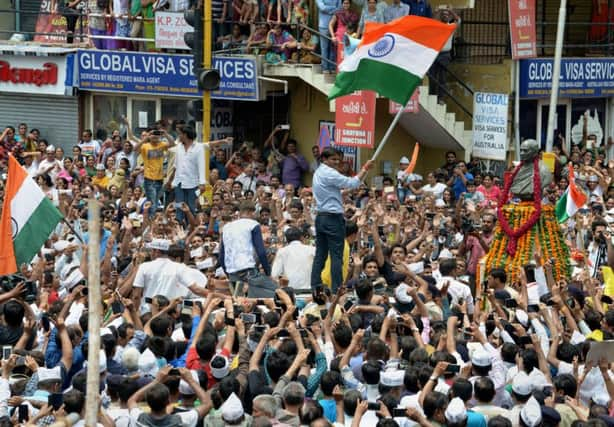India: Caste riots lead to Gujarat state curfew


Authorities imposed a curfew on Tuesday night in at least five cities in Gujarat state, after mobs attacked police with stones and sticks and burned vehicles. Mobile phone communications were blocked in the main city of Ahmadabad to stop both rumours from spreading and gangs from co-ordinating their movements.
No casualties have been reported as the leader of the Patidars, also known as the Patel community for the last name they share, called a general strike yesterday. There were isolated clashes between protesters and police in several other cities in Gujarat, including the diamond cutting and polishing hub of Surat.
Advertisement
Hide AdAdvertisement
Hide AdTelevision stations reported that police fired tear gas to disperse the crowds in some parts of the state.
The Patels are demanding the special status given to many minorities in India, guaranteeing them a share of government jobs and school places. They make up about 20 per cent of Gujarat’s 63 million people and say their livelihoods based on seasonal farming and small industry have become increasingly difficult amid India’s agricultural malaise and rapid economic growth marked by high inflation.
India’s constitution sets out affirmative action, called reservations, for India’s lowest Dalit and Untouchable castes to help them overcome centuries of discrimination.
That has been expanded over the years to include several other relatively disadvantaged low-caste groups.
Because reservations allow easier access to government jobs, schools and universities, they have become a huge political bargaining chip in India, a country of 1.2 billion people, and over the past decade several groups have led violent protests to demand that they be counted at the bottom of India’s complex caste system.
On Tuesday, Patel leaders led a rally attended by 500,000 community members from across Gujarat. Later, police detained the group’s 22-year-old firebrand leader Hardik Patel, triggering riots.
Hardik Patel called for a strike yesterday across Gujarat, the state that prime minister Narendra Modi administered as chief minister for 12 years.
The streets of Ahmadabad were deserted and schools, colleges and businesses were closed. The only crowds were large groups of people gathered in the city’s Patel-dominated neighbourhoods.
Advertisement
Hide AdAdvertisement
Hide AdMr Modi’s successor as chief minister, Anandiben Patel, has urged members of her own community to maintain the peace. She has said that giving into the demands of the Patels was not possible because India’s Supreme Court has mandated that state governments can set aside only 50 per cent of jobs and school seats for economically backward groups and that existing low-caste groups already fill those places.